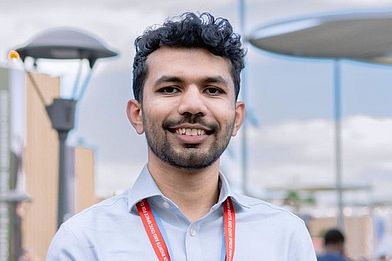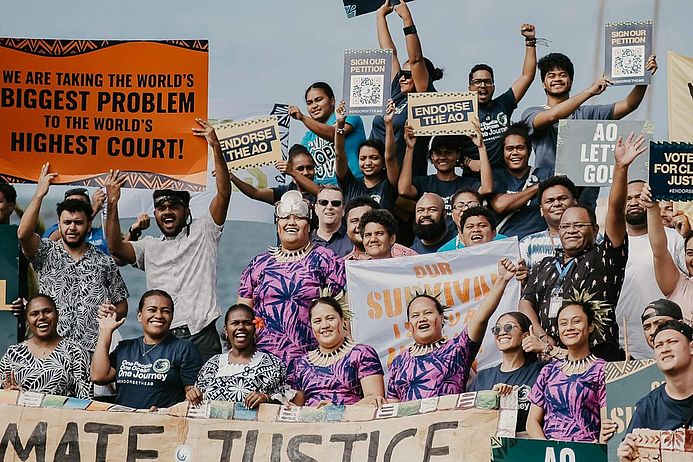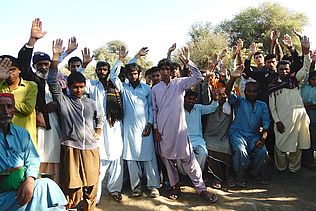Despite the omnipresence of the climate crisis, global greenhouse gas emissions are not decreasing, but increasing. There are increasingly frequent attempts to curb this trend using instruments of international law. One of the most prominent initiatives currently underway is that of World's Youth for Climate Justice, whose multi-year campaign will culminate in a legal opinion from the International Court of Justice (ICJ) this summer. We spoke to Vishal Prashad from Fiji, one of the initiators, about this.

medico: You have been working for several years on the initiative and finally succeeded in getting the United Nations General Assembly to commission an advisory opinion from the International Court of Justice on the obligations of states in relation to climate change. At the hearings earlier this year, almost 100 states and many civil society organizations expressed their views. Can you briefly explain who you are and what your case is about?
Vishal Prasad: Our organisation took up its work in 2019, initiated by a group of southasien law students, with the aim of pushing for the world’s highest court to issue an advisory opinion on climate change and human rights. The purpose of an advisory opinion would be to outline and clarify what states’ obligations are in addressing the climate crisis, and what consequences they will have to face if they fail to meet them. We operate this along with 18 Pacific island countries, and receiving endorsement from the government of Panaotu.
We see the advisory opinion as an overall exercise to develop an international, progressive interpretation of international law that is able to meet the challenges of the climate crisis, and which later cases, at the international, national, and regional level, can then further expand on. The ICJ clarifies the principles, the frameworks, and what the law is, for domestic courts to apply later on in a case-by-case basis.
You have been working on your initiative for several years already, but it will only result in expert opinions and not a legal judgment. Why did you even though start your initiative?
There seems to be an apparent disconnect prevailing in European understandings of, on the one hand, the problem of climate change, and, on the other, the concept of climate justice. While most seem to get the issue with the former, the latter is not well understood, a dynamic which also plays out in climate negotiations. We have witnessed attempts by developed countries to divert responsibility from their historical role in causing the climate crisis, choosing instead to berate developing countries for their current emissions. This dynamic is further seen in the failure to meet obligations regarding the 1.5 C goal or climate finance and attempts to limit the scope of climate negotiations and multilateral processes. A clear disavowal of responsibility towards future generations is also apparent.
We believe that the impact of an advisory opinion from the ICJ is the most authoritative and constructive route available for an independent clarification of the legal implications of climate change under international law and will be far-reaching. To a certain extent, it sets the framework for the whole debate on climate compensation, which is currently being discussed relatively inconclusively at the world climate conferences. There have been pledges of sums of money at this political level, but on the one hand they are inadequate, they do not contain any legal entitlement and they have not yet been honored by the states. We have also observed that major emitters have been aware of the climate-damaging effects of their activities for decades, but continue to do so anyway, partly because they are not prevented from doing so by legal regulations. In our opinion, the advisory opinion will help to establish clear legal standards for climate protection and climate compensation.
2019 was the year of global uprisings; groups like Fridays for Future got visibility that was not there before. Why this moment to focus on the judicial approach, at a time when many were focusing on politics?
We don’t see this as a contradiction. The technical limitations and voluntary nature of action within the existing mechanisms and COP frameworks represent a disproportionate response to climate change in light of the urgency of the situation; particularly for us in the Pacific region, climate change represents the single greatest existential and security threat to people living here. We are basically in the fight of our lives, while Greenhouse gas emissions keep growing. This reality has demanded an all-hands-on-deck approach that requires us to look at every possible lever of power to pull at.
And although there may have been a spike in attention regarding climate change in 2019, six years on we still see very little reference to human rights in these spaces, and we’re still fighting for the same issues that we were fighting for then. People on the front lines, marginalised and vulnerable communities, are not able to enjoy their most basic human rights due to the impacts of climate change. We wish to flesh out this connection between human rights law and climate, and we believe that the ICJ is the best avenue to draw the connection. We see the advisory opinion as a way to change the narrative, inject a new tool into existing systems, and catalyse greater action.
Meanwhile the world has changed to another one. Institutions as international court of justice lost their credibility while multilateral institutions had been undermined by western world.
We have been clear from the beginning that the advisory opinion we would get from the ICJ is not going to be a silver bullet that solves the climate crisis. It’s going to be a tool that will be handed down, clarifying what the law is. What is then needed is a concerted, united push from civil society, from governments, from communities, and people from all levels, to push and hold our governments accountable. It’s another leveraging tool among others to push that action; the work of operationalising the advisory opinion still falls on all of us after it’s delivered. Furthermore, in light of attacks on multilateral systems and institutions, and, as some would have it, their decline, the ICJ advisory opinion could also harbour the potential to reinforce and strengthen these systems. By providing a clear path for change, and addressing the climate crisis, you can instil confidence and bring back the declining relevance of these institutions and spaces.
Your close to the release of an advisory opinion. What have you observed in the meantime as effects coming from your initiative?
There has already been a proliferation of climate litigation, despite the advisory opinion still being in process. What we hope to see, and what we anticipate, is an exponential rise after the advisory opinion comes out. We've seen the International Tribunal for the Law of the Sea issue its advisory opinion; now the opinion the ICJ would issue, and then, of course, the Inter-American Court of Human Rights, whose advisory opinion is also pending to be released this year as well. So, there is a huge development in the norms and principles, and clarification of international law.
What change will it bring to the most affected people and areas?
Depending on the opinion and what comes out of it, it could provide a guide forward in terms of how to operationalise and implement the opinion. If we have a determination that human rights law is equally relevant, then that will open up a lot of avenues to hold governments to account. For example, with legal issues relating to fossil fuels: if there is a breach of human rights, and therefore states’ obligations, then there is an obligation to stop the breach and, in this case, stop the emission of fossil fuels. So, the whole discussion around the phasing out of fossil fuels could be strengthened through an advisory opinion. Equally so with the topics of loss and damage, and the allocation of funds [as climate remittances?] – also part of states’ obligations: a favourable opinion by the ICJ could help boost action to bring about the implementation of such measures.
Can you tell us about the different reactions of states speaking up at the hearing at the ICJ.
I think the most interesting fact was that a number of countries stood before the ICJ to argue, quite outrageously, that future generations is an abstract concept not relevant for the consideration of international law now. These same countries, who call themselves leaders on climate change action and on human rights, were arguing before the ICJ that human rights law should not be relevant to all of this. There were also attempts to limit the scope of the court, arguing that the court does not have jurisdiction. These attempts form part of the derailing tactics used by the Global North countries to limit their historical responsibility and blunt the impact of the advisory opinion as much as possible.
As for the large emitting countries, such as the U.S., I do not expect them to become champions for the advisory opinion; they’ve already done a lot to derail the process as much as possible. The effects of the advisory opinion, however, go beyond the term of any one president. This is about setting international law for decades, potentially generations. This is about the bigger scheme of things and trying to set up frameworks that work for future generations.
In Germany we have the more recent believe that we are doing much better than, for instance, China.
I think the best response to this is the principle of common but differentiated responsibilities: that countries that have done the most to cause the climate crisis should bear the largest burden when it comes to responding to the problem of climate change. Even a narrow, traditional look at the climate regime defines who the developed countries are and what obligations they have. And these obligations, such as providing climate finance, or regarding the temperature goal of 1.5 and NDCs, are not being met. There is this huge attempt to muddy the waters on who’s been polluting and who’s polluting now. This is exactly the kind of hypocrisy we see at these climate conferences, where the developed countries are constantly trying to blame developing countries for the continued emission of fossil fuels, when it is these same countries that attained their development on the back of fossil fuels. Therefore, there is a question regarding sustainable development and how it relates to the idea of self-determination, and, importantly, whether countries should be allowed to develop. There must be a differentiated way of looking at this issue, and the principle of equity must find its way in here. If you are calling yourself a developed country, this comes with certain obligations and responsibilities that should not be shied away from.
What does climate justice mean to you?
The ideal of climate justice is the ability for young people to live in a space without the fear of a crisis that we have not created. The inequality angle is also important, holding these countries accountable so that the young people now, and future generations, do not have to battle the same challenges. For us in the Pacific, it also means the preservation of our culture, our identity, and our land, so that they are enjoyed and shared by future generations as well.
The interview was conducted by Karin Zennig.


